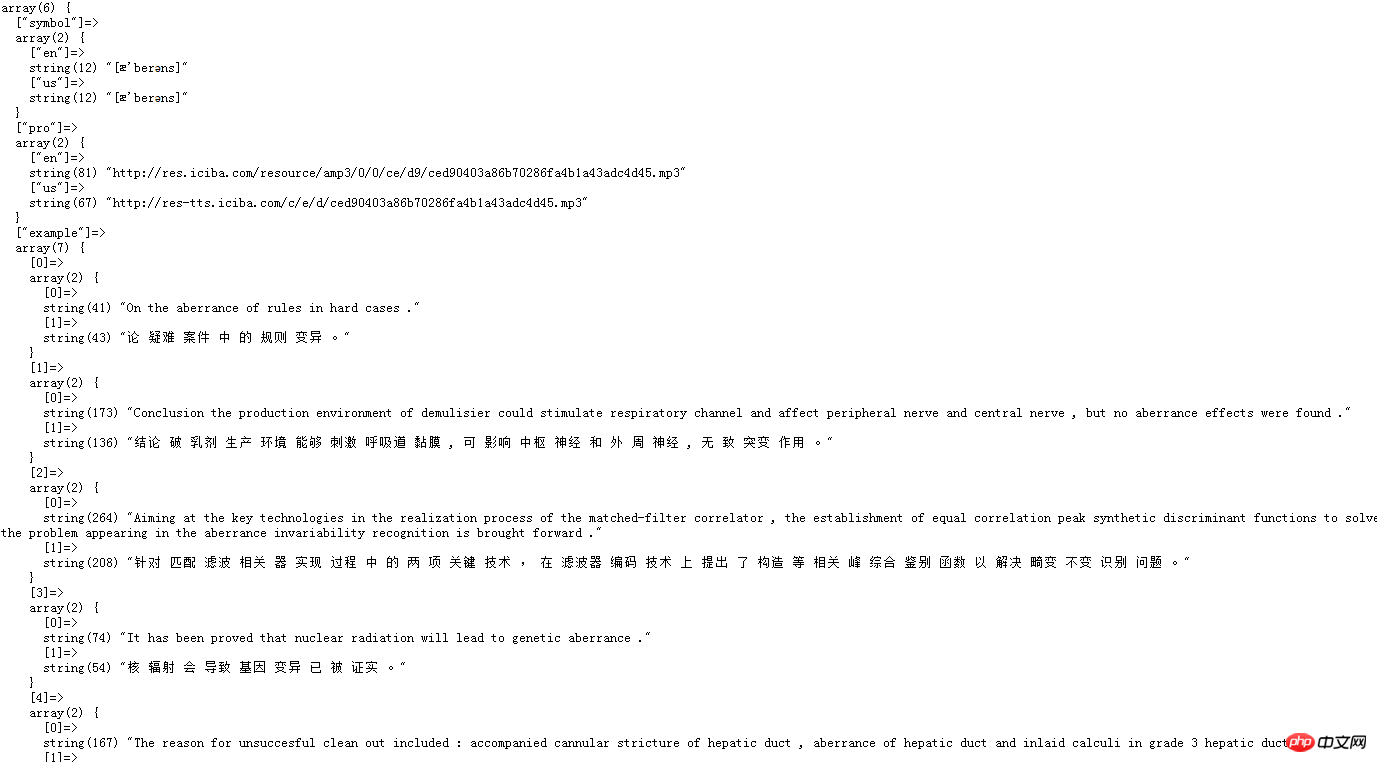
In diesem Artikel werden hauptsächlich relevante Informationen zum Erstellen eines Baidu-Wörterbuch-Wortsuchsammlers mit PHP vorgestellt. Ich hoffe, dass er für alle hilfreich ist.

Baidu-Dikt-Sammlungsbeispiel
wurde geschrieben, um alle Ergebnisdaten nach der Übersetzung des Baidu-Dikt-Wörterbuchs zu sammeln. Natürlich wird es mit einer 13,5-W-Wortbibliothek geliefert und einfache Sammlungsfälle. Hier gebe ich die von mir geschriebene Hauptklasse dict.class.php frei. Wenn Sie sie benötigen, können Sie sie einfach teilen Leute, die dieses Ding benutzen. Nur wenige, also haben die nützlichen Brüder es weggenommen~
<?php
/**
* dict.class.php 采集百度词典翻译内容
*
* @copyright (C) 2014 widuu
* @license http://www.widuu.com
* @lastmodify 2014-2-15
*/
header("content-type:text/html;charset=utf8");
class Dict{
private $word;
//显示的条数
private static $num = 10;
public function __construct(){}
/**
* 公用返回百度采集数据的方法
* @param string 英文单词
* retun array(
* symbol" => 音标
* "pro" => 发音
* "example"=> 例句
* "explain"=> 简明释义
* "synonym"=> 同反义词
* "phrase" => 短语数组
* )
*
*/
public function content($word){
$this -> word = $word;
$symbol = $this -> Pronounced();
$pro = $this->getSay();
$example = $this -> getExample();
$explain = $this -> getExplain();
$synonym = $this -> getSynonym();
$phrase = $this -> getPhrase();
$result = array(
"symbol" => $symbol, //音标
"pro" => $pro, //发音
"example"=> $example, //例句
"explain"=> $explain, //简明释义
"synonym"=> $synonym, //同反义词
"phrase" => $phrase //短语数组
);
return $result;
}
/**
* 远程获取百度翻译内容
* get function curl
* retun string
*
*/
private function getContent(){
$useragent = "Mozilla/5.0 (Windows NT 6.1; WOW64; rv:23.0) Gecko/20100101 Firefox/23.0";
$ch = curl_init();
$url = "http://dict.baidu.com/s?wd=".$this->word;
curl_setopt($ch, CURLOPT_URL, $url);
curl_setopt($ch, CURLOPT_USERAGENT,$useragent);
curl_setopt($ch, CURLOPT_RETURNTRANSFER, TRUE);
curl_setopt($ch, CURLOPT_FOLLOWLOCATION, 1);
curl_setopt($ch, CURLOPT_HTTPGET, 1);
curl_setopt($ch, CURLOPT_AUTOREFERER,1);
curl_setopt($ch, CURLOPT_HEADER, 0);
curl_setopt($ch, CURLOPT_TIMEOUT, 30);
$result = curl_exec($ch);
if (curl_errno($curl)) {
echo 'Errno'.curl_error($curl);
}
curl_close($ch);
return $result;
}
/**
* 获取百度翻译发音
* retun array(英,美)
*
*/
private function Pronounced(){
$data = $this -> getContent();
preg_match_all("/\"EN\-US\"\>(.*)\<\/b\>/Ui",$data,$pronounced);
return array(
'en' => $pronounced[1][0],
'us' => $pronounced[1][1]
);
}
/**
* 获取百度翻译发音
* return array(英,美)
*
*/
private function getSay(){
$data = $this -> getContent();
preg_match_all("/url=\"(.*)\"/Ui",$data,$pronounced);
return array(
'en' => $pronounced[1][0],
'us' => $pronounced[1][1]
);
}
/**
* 获取百度翻译例句
* return array() 多维数组 例句
*
*/
private function getExample(){
$str = "";
$data = $this -> getContent();
preg_match_all("/var example_data = (.*)\]\;/Us",$data,$example);
$data1 = "[[[".ltrim($example[1][0],"[");
$data2 = explode("[[[",$data1);
$num = count(array_filter($data2));
foreach($data2 as $key => $value){
$data3 = explode("[[","[[".$value);
foreach ($data3 as $k => $v) {
preg_match_all("/\[\"(.*)\",/Us","[".$v, $match);
if(!empty($match[1])){
$str .= implode($match[1]," ")."@";
}
}
}
$data4 = trim($str,"@");
$data5 = explode("@", $data4);
$result = array_chunk($data5, 2);
return $result;
}
/**
* 获取简明释义
* return array (x => "词性",b => "附属")
*
**/
private function getExplain(){
$data = $this -> getContent();
preg_match_all("/id\=\"en\-simple\-means\"\>(.*)\<p(\s+)class\=\"source\"\>/Us",$data,$explain);
$r_data = $explain[1][0];
preg_match_all("/\<p\>\<strong\>(?P<adj>.*)\<\/strong\>\<span\>(?P<name>.*)\<\/span\>\<\/p\>/Us", $r_data, $a_data);
preg_match_all("/\<span\>(?P<tag>[^\>]+)\:\<a(\s+)href\=\"(.*)\"\>(?P<word>.*)\<\/a\>\<\/span\>/Us", $r_data, $b_data);
$result = array();
foreach ($a_data["adj"] as $key => $value) {
$result[$value] = $a_data["name"][$key];
}
$word_b = array();
foreach ($b_data["tag"] as $key => $value) {
$word_b[$value] = strip_tags($b_data["word"][$key]);
}
$result_data = array("x" => $result,"b" => $word_b);
return $result_data;
}
/**
* 获取同义词
* return array(0 => "同义词", 1 => "反义词") 一般为多维数组
*
*/
private function getSynonym(){
$data = $this -> getContent();
preg_match_all("/id=\"en\-syn\-ant\"\>(.*)<p(\s+)class\=\"source\">/Us",$data,$synonym);
$content = $synonym[1][0];
$data1 = explode("</dl>", $content);
$result = array();
$data2 = array();
foreach ($data1 as $key => $value) {
preg_match_all("/\<strong\>(?P<adj>.*)\ \;\<\/strong\>\<\/p\>\<p(\s+)class\=\"syn\-ant\-list\"\>\<ul\>(?<content>.*)\<\/ul\>/Us", $value, $r_data);
$data2[$key]["adj"] = $r_data["adj"];
$data2[$key]["content"] = $r_data["content"];
}
foreach ($data2 as $key => $value) {
foreach ($value["content"] as $k => $v) {
if(!empty($v)){
preg_match_all("/\<li\>\<p\>(?P<title>.*)\<\/p\>(?P<value>.*)\<\/li>/Us", $v, $v_data);
foreach ($v_data['title'] as $m => $d) {
$data = strip_tags(preg_replace("<</a>>"," ", $v_data["value"][$m]));
$result[$key][$value["adj"][$k]][$d] = $data;
}
}
}
}
return $result;
}
/**
* 获取短语词组
* return array (key => value) 一维或者多维数组
*
*/
private function getPhrase(){
$num = self::$num;
$data = $this -> getContent();
preg_match_all("/id=\"en\-phrase\"\>(.*)\<p class\=\"source\"\>/Us",$data,$phrase);
$data = explode("</dd>",$phrase[1][0]);
$data1 = array_slice($data,0,$num);
$result = array();
foreach ($data1 as $key => $value) {
$data2 = explode("</p>", $value);
$n = count($data2);
if($n<=3){
$result[str_replace(" ","",strip_tags($data2[0]))] = strip_tags($data2[1]);
}else{
$data3 = array_slice($data2,0,$n-1);
$data4 = array_slice($data2,0,2);
$res = array_diff($data3,$data4);
$data5 = array_chunk($res,2);
$key_value = trim(str_replace(" ","",strip_tags($data4[0])));
$result[$key_value] = strip_tags($data4[1]);
foreach ($data5 as $key => $value) {
foreach ($value as $k => $v) {
$value[$k] = strip_tags($v);
}
$array = array($result[$key_value],$value);
if (array_key_exists($key_value, $result)){
$result[$key_value] = $array;
}
}
}
}
return $result;
}
/**
* 将数组转换为字符串
*
* @param array $data 数组
* @param bool $isformdata 如果为0,则不使用new_stripslashes处理,可选参数,默认为1
* @return string 返回字符串,如果,data为空,则返回空
*/
private function array2string($data, $isformdata = 1) {
if($data == '') return '';
if($isformdata) $data = $this->new_stripslashes($data);
return addslashes(var_export($data, TRUE));
}
/**
* 返回经stripslashes处理过的字符串或数组
* @param $string 需要处理的字符串或数组
* @return mixed
*/
private function new_stripslashes($string) {
if(!is_array($string)) return stripslashes($string);
foreach($string as $key => $val) $string[$key] = $this->new_stripslashes($val);
return $string;
}
}
// $word = new dict("express");
// $word ->content();Verwandte Empfehlungen:
Zusammenfassung der PHP-Grundkenntnisse (notwendig für Anfänger)
Der Unterschied zwischen PHP-Grundlagen und JavaScript-Operationen (Sammlung)
Detaillierte Erläuterung des Beispiels einer grundlegenden PHP-Kontrollstruktur
Das obige ist der detaillierte Inhalt vonBeispiel für die Erstellung eines PHP-Abfragewörterbuchs. Für weitere Informationen folgen Sie bitte anderen verwandten Artikeln auf der PHP chinesischen Website!
 So öffnen Sie eine PHP-Datei
So öffnen Sie eine PHP-Datei
 So entfernen Sie die ersten paar Elemente eines Arrays in PHP
So entfernen Sie die ersten paar Elemente eines Arrays in PHP
 Was tun, wenn die PHP-Deserialisierung fehlschlägt?
Was tun, wenn die PHP-Deserialisierung fehlschlägt?
 So verbinden Sie PHP mit der MSSQL-Datenbank
So verbinden Sie PHP mit der MSSQL-Datenbank
 So verbinden Sie PHP mit der MSSQL-Datenbank
So verbinden Sie PHP mit der MSSQL-Datenbank
 So laden Sie HTML hoch
So laden Sie HTML hoch
 So lösen Sie verstümmelte Zeichen in PHP
So lösen Sie verstümmelte Zeichen in PHP
 So öffnen Sie PHP-Dateien auf einem Mobiltelefon
So öffnen Sie PHP-Dateien auf einem Mobiltelefon




